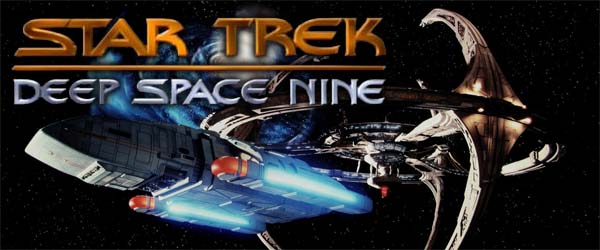
In the age of streaming and binge-watching here in the year 2023, long-form serialized television is now ubiquitous. Every network and streaming service has wanted its own blockbuster TV shows. Whether it's AMC's The Walking Dead and Breaking Bad, HBO's Game of Thrones, Sci-Fi's Battlestar Galactica, Netflix's House of Cards and Stranger Things, History's Vikings, and so forth, it seems that every big new show outside of sit-coms has a heavily-serialized format. Procedural dramas are going the way of the dinosaur.
Serialized, long-form television may be commonplace now, but back in the 1990's, it was virtually unheard of outside of daytime soap operas (such as Dallas and Dynasty) and the occasional network mini-series. At least, this was the case in the United States. British television has a much longer track record of serialized story-telling. A big part of why serialized television was uncommon was that the producer(s) of network syndicacted shows didn't have as much control over when its affiliates decided to air the shows, or how heavily they would market and advertise it. Furthermore, the networks or affiliates could change the time slot of the show pretty much at a whim. Viewership, therefore, would be much more fickle and fractured. Audiences would pop in and drop out. Expecting the audience to have seen every previous episode in preparation for this week's episode was a dangerous and risky expectation for a production studio. It's easy to lose viewers if none of them know what's going on.
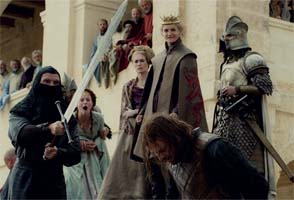 - Game Of Thrones, copyright HBO
- Game Of Thrones, copyright HBO
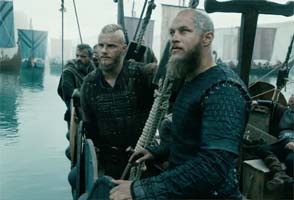 - Vikings, copyright History Channel
- Vikings, copyright History Channel
Highly serialized, long-form drama are the norm for modern networks and subscription television services.
As I mentioned in the previous essay, this was the case with me. I was in elementary school and middle school during DS9's run, and I missed a lot of episodes in the first couple seasons, despite wanting to watch the show. Missing so many episodes meant that I had very little idea what was going on when I would watch, and so I mostly lost interest in the show. If my dad was watching it, and I was there, I'd watch it, but I wasn't planning my day around it.
Looking back now, that sort of serialized story-telling is now ubiquitous and expected, and so it's easier to recognize that Deep Space Nine was truly innovative and ahead of its time in this regard.
Long-form story-telling
Serialized story-telling wasn't alien to Star Trek. Deep Space Nine premiered in 1993, the same year as the sixth season of Next Generation. By this time, The Next Generation had several story threads that had recurred over the course of a season, or over multiple seasons -- as well as several attempted overarching plot threads that were dropped.
As early as the first season of Next Generation, Q had become a recurring antagonist, and his "judgement" over the human race was established as a recurring plot thread. Heck Q's judgement of humanity was originally depicted as the framing mechanism for the entire show! It was scaled back in the following seasons due to the general poor reception of the first season, and the fact that John de Lancie just works better in a more whimsical and comic role.
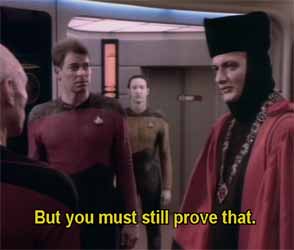 - TNG "Encounter At Farpoint", season 1, episode 1
- TNG "Encounter At Farpoint", season 1, episode 1
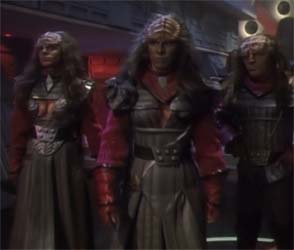 - TNG "Redemption, Part I", season 4, episode 26
- TNG "Redemption, Part I", season 4, episode 26
TNG had several recurring plot threads.
The final two episodes of Next Generation's first season, "Conspiracy" and "The Neutral Zone", seem to have been part of an abandoned attempt at more long-form story-telling. Both seem to be trying to establish some new threat to the Federation (and possibly a shared threat between the Federation and other rival powers such as the Romulans). I think the original idea was for this to become an overarching storyline for the entire series. But the thread from "Conspiracy" was completely dropped, and the destroyed colonies referenced in "The Neutral Zone" were re-written to be retroactive foreshadowing of the Borg's appearance in season 2.
[More]
cddb26c9-ca5a-4327-b199-d0d00dec522b|0|.0
Tags:Star Trek, Star Trek: Deep Space Nine, Federation, Starfleet, progressivism, humanism, secularism, religion, fundamentalism, fascism, terrorism, war, trans-gender, Worf, Odo, Quark, Moogie, Ishka, Bajor, Dominion, Founder, Changeling, Jem'Hadar, Cardassian, streaming television, Game of Thrones, Battlestar Galactica, the X-Files, Babylon 5, Buffy the Vampire Slayer, The Sopranos, Lost, Twin Peaks

The Next Generation, Deep Space Nine, and (depending on who you talk to) Voyager are widely regarded as the "Golden Age" of Star Trek. Since many Trekkies look back at this time period of the late 80's and 90's with the rose-tinted glasses of nostalgia, it might surprise you to read that Deep Space Nine used to be a highly divisive topic among Star Trek fans. Even to this day, I've talked to "hardcore" Trek purists who dislike Deep Space Nine because of how dark and conflict-driven the series is. I can't imagine what these people must think of the Kelvin-verse reboots, Star Trek: Discovery, or Picard. If you think I'm hard on those recent iterations of Star Trek, then you should talk to these people!
In any case, the idea that DS9 is too dark and conflict-driven is a valid criticism from someone coming from the perspective of a fan of The Original Series and Next Generation. Both of those shows were about an idealistic future in which humanity had grown out of its petty squabbles and now seeks to better itself through cooperative exploration and colonization of space. Deep Space Nine didn't quite accept those ideas at face-value. Deep Space Nine's more pragmatic approach had some fans believing that Deep Space Nine violated the spirit of Star Trek.
Many fans of The Original Series and Next Generation criticized Deep Space 9 for being "too dark".
Deep Space Nine was also the first Trek series to be highly serialized, having a singular, overarching plot throughout most of the series, and with frequent mini-arcs running for half a season or a whole season. TNG had its share of recurrent story arcs. Q's "trial of humanity" was pitched as a framing mechanism for the entire show, but ended up only serving to bookend the series, while relegating most of Q's appearances each season as comic tangents. There were other recurrent sub-plots as well, such as Worf's discommendation from the Klingon Empire and his conflict with the Duras House in the "Sins of the Father" arc, the Borg story thread, Data's relationship with his brother Lore, Wesley's training as a Starfleet officer, and a few others. But TNG stayed mostly episodic. Almost all the single episodes of TNG (and the two-parters as a whole) can be enjoyed independently, without having seen any previous episodes of TNG. That was not the case with DS9.
I missed many episodes of DS9 because
it aired on weekend evenings.
DS9 was on the air throughout my elementary school and middle school years (I was seven when the show premiered). It frequently aired (syndicated on Fox in my region) on weekend evenings, and I was often outside playing tag, riding bikes, or playing touch football or street basketball with neighbor kids. As such, I missed a lot of episodes. Due to the highly-serialized nature of the show, when I would see an episode, I would have no idea what was going on! Because I rarely watched the show, and didn't understand it when I did see it, I didn't particularly like it. I'd still watch it, because it was still Star Trek. In fact, Voyager was the first Star Trek series that I watched regularly (it being on Wednesday nights, when I wasn't outside playing), and, well, you all know how I feel about Voyager.
In fact, I grew up with a bit of a preconceived notion that Deep Space Nine was the "bad" Star Trek series -- even though critics at the time largely appreciated it. On the off chance that I could talk about Star Trek with a peer, they generally didn't like DS9 either -- for many of the same reasons.
It wasn't until my college years, when the show was released for sale on DVD that I sat down and watched the whole series from start to finish. At first, I wasn't even sure if I wanted to bother buying the DVDs. After all, DS9 was "the bad Star Trek". So why spend the money? And those DVDs cost a lot of money! CBS wanted something like $120 for a single season, compared to $30 or $40 a season for shows like E.R. or Grey's Anatomy. At least the Next Gen DVDs came in fancy, sturdy boxes. The DS9 DVDs came in cheap, flimsy, rigid plastic booklets that start to fall apart as soon as you open them. I think my mom bought them from Costco for $90 a pop -- a considerable discount, but still obnoxiously expensive!
CBS wanted $120 per season for DS9 DVDs!
I was now older. I was coming to terms with my personal identity as a progressive secular humanist. Most importantly, I could finally follow along with the various multi-episode story threads and the complex, nuanced characterizations. And boy, did my opinions on the series change!
I'll always have a soft spot for Next Generation. That show has my favorite Trek character: Data. And Picard is probably my third favorite character after Spock. After my single favorite episode of Trek, the Original Series' "Balance of Terror", most of my runner-up favorite episodes are TNG episodes. Episodes like "The Measure of a Man", "Who Watches the Watchers", "The Offspring", "The Best of Both Worlds", "Deja Q", "I, Borg", "Tapestry", "The Inner Light", "Darmok", "All Good Things...", and so on...
Despite my fondness for Next Generation, I actually think that Deep Space Nine is the better all-around show.
Every Trek series since the original has taken a couple years to really find its footing. TNG doesn't really figure itself out until midway through season 2, and Voyager takes until the 4th season to figure itself out -- if ever. I don't know if Discovery ever righted its ship, since I didn't bother to watch past the first season, and Picard didn't even become watchable until the third season. I feel like DS9 finds its footing much earlier than TNG or Voyager. Deep Space Nine's characters, themes, and stories start to fall in place by the end of season 1. In fact, one of my favorite episodes of the entire series (and one of my favorite episodes of Trek in general) is a season 1 episode: "Duet". DS9 is the only Trek series (since the original) for which one of my favorite episodes comes as early as the first season.
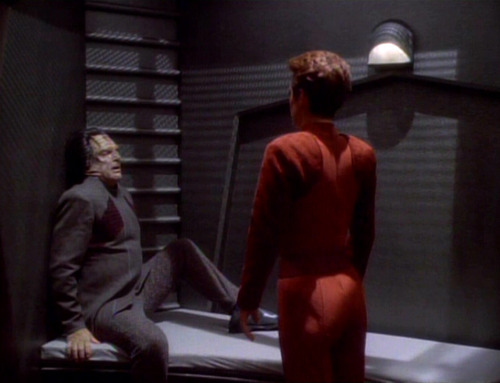 - DS9 "Duet", season 1, episode 19
- DS9 "Duet", season 1, episode 19
One of my favorite DS9 episodes (and Trek episodes in general) is the season 1 Holocaust allegory, "Duet".
The last episode of season 1, "In the Hands of the Prophets" starts to set up the season-long arcs (and a series-long arc) that would become a trademark of the series. That episode introduces us to recurring villain Vedek Winn and starts the process of her gradual accumulation of power, which we'll talk about later.
But despite the series coming together better in the first season, critics of Deep Space Nine aren't wrong when they say that it "feels different" from the Original Series or Next Generation. The show is unarguably darker and more conflict-driven. The entire second half of the series is about an interstellar war, and the seasons leading up to that repeatedly tell stories about domestic terrorism, Holocaust allegories, religious persecution, and cynical politics. These sorts of themes were present in episodes of TOS and TNG here and there, but DS9, at a fundamental level, was about these difficult topics.
[More]
79b833d8-97bd-4e2f-b45e-9f666db1588a|1|5.0
Tags:Star Trek, Star Trek: Deep Space Nine, Gene Roddenberry, Federation, Starfleet, culture, ideals, cooperation, socialism, post-scarcity economics, alien, multi-culturalism, progressivism, humanism, secularism, terrorism, war, Benjamin Sisko, Kasidy Yates, Odo, Quark, Ferengi, Klingon, Cardassian, Dominion, Bajor

The announcement trailer for Sid Meier's Civilization VI made me very excited. Not just because there was a new iteration of my favorite PC game franchise, but also because the message of the trailer made me excited for the possibility that Civilization VI would take a much more humanist and globalist approach to its gameplay and victory conditions.
The Civilization games have always had a very optimistic tone, treating human development as being constantly progressing forward. Growing your civilization and building more things is almost always better. For the most part, Civilization treats human history as a constant forward march towards a better, more prosperous tomorrow.
This is despite the games including mechanics for "Dark Ages", climate change, nuclear fallout, occasionally pandemics and plagues, and so forth. Regardless of these mechanics, the civilizations of the game never regress, unless it's by the sword or gun of a conquering civilization, in which case, that other civilization is glorified. Climate change or nuclear winter can run rampant and render the surface of the Earth borderline uninhabitable for modern human life, but a civilization can still accumulate enough science or tourism or faith or diplomatic votes to win one of the various victories, or they can be the sole surviving civilization, presiding over a barren wasteland. But it's still a win.
Civilization is a game about cutthroat nationalism.
Despite vague gestures towards diplomatic cooperation and solving global crises, Civilization is, at its core, a game of competitive, cutthroat, zero-sum nationalism. This design ethos is probably the result of Civilization's inspirations coming from competitive board games like Avalon Hill's Civilization and Risk. "Our country is better than your country," and the whole game is an exercise in proving that. Further, one civilization's success must come at the expense of every other civilization's failure, even if those civilizations are friends or allies. One civ wins; all others lose. Every decision made is done to move your civilization closer towards one of those victory conditions, and every diplomatic agreement, trade deal, or alliance that you strike is only a temporary means to that end.
So what did Civ VI's trailer do to change my expectations for that game?
This essay is also available in video format on YouTube.
The trailer
Well, first, it's important to know how previous trailers and intro cinematics for Civilization games had introduced their respective games. Usually, they emphasized a single nation or leader doing great things. Winning wars, building wonders, developing advanced technologies, and so forth. And they usually ask the viewer: "How will you run your civilization?" and "Will your civilization stand the test of time?"
The trailer for Civilization VI takes a different approach. Let's take a look:
Civilization VI's announcement trailer celebrates the collective achievements of all of humanity.
"We are the explorers, the inventors, the architects of change, the builders of a better tomorrow.
We strive, we dream, we inspire, always towards something greater.
All the odds we defy, the risks we take, the challenges we endure, only make us stronger.
There's no end to our imagination, and no limit to civilization."
- Sean Bean narrating Civilization VI announcement trailer
Notice the language that is used. The Civ VI trailer uses plural language such as "we", "us", and "out". "We are the builders of a better tomorrow.". "the challenges we endure, only make us stronger." "There is no end to out imagination, and no limit to civilization.". And so forth. The trailer for Civilization VI isn't a celebration of one civilization or leader rising above all others and being crowned the "greates" civilization; it's about the collective achievement of all of humanity -- not a civilization, but all human civilization!
It's a beautifully humanistic expression that emphasizes plurality and doesn't elevate any one culture or race or nation above any other. It celebrates the collective technological advancements, engineering, art, and struggles of all of humanity, without implying that any one nation or group has the best stuff. It emphasizes that we can overcome challenges by working together, and come out the other side stronger for it. It implies that when we cooperate to build something or solve a problem, the result will be better than what any individual entity can accomplish. [More]
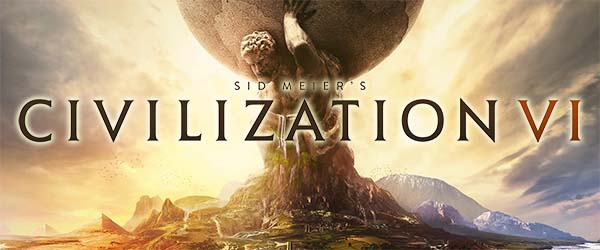
Firaxis has given me a belated birthday gift by releasing Civilization VI. They've also ensured that I don't get very much productive done during the months of October and November this year, since I've been sinking a whole lot of time into "one more turn"-ing myself late into the night. I've barely scratched the surface of the newly-released Dark Souls III DLC, my Madden franchise has fallen behind, and I haven't even bothered buying recently-released games like the new Master of Orion. My board game collection has been collecting dust, and my Dungeons & Dragons campaigns have been on hiatus. I'll get back to all those things after one more turn.
Oozing with production quality
The first thing that stood out to me upon entering my first game was the artwork. It's a pretty stark contrast from Civilization V's visuals. Civ V favored a semi-photo realistic quality. Many screenshots of the game's map look like satellite photos, and units (though exceedingly large) looked and animated realistically. This created a lot of pretty screenshots (still images), but the game looked kind of static, washed-out, and dull in motion. VI, on the other hand, goes for an exaggerated, vibrant, and more cartoonish look that reminds me a lot more of Civ IV and Civ Revolution.
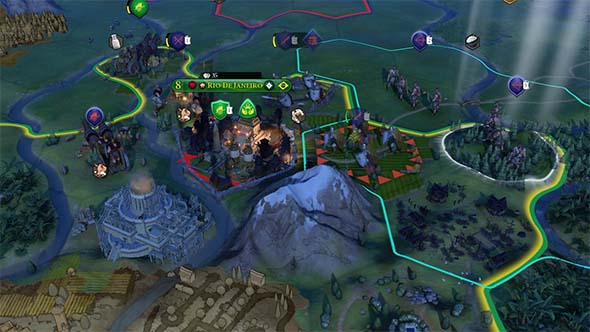
The graphics are vibrant and highly informative. Everything that you see on screen genuinely means something.
What I really like is how utilitarian the visuals are. Almost everything on the game map is communicating part of the state of the game to the player. You can see every piece of infrastructure in and around a city, as well as exactly which tiles are being worked, all without having to open a separate screen and without having to clutter the screen with extra UI icons. There's even different graphics to represent the different phases of a building or wonder's construction that tells you exactly what that city is currently constructing, and how close it might be to finishing that wonder. It's attractive, but it's also clean and informative.
The fog of war is also wonderfully functional and neat to look at. This game renders the fog of war with the style of a hand-drawn map on canvas (similar to Total War: Shogun 2, which I loved). Heck, there's even an animated day/night cycle that was seemingly added because ... why not?
Improvements have different graphics for when they're un-worked [LEFT] versus worked [RIGHT].
The rest of the game shows similarly high production quality. There's actual cinematics for the win screens instead of dialogue boxes with a static image. Finishing a wonder results in an in-game cutscene of that wonder's construction. It isn't quite as pretty as Civ IV's pre-rendered wonder movies, but makes up for it by providing a sense of context that makes me feel like I'm seeing "my Oracle" instead of just the Oracle. There's more historic quotes, all of which are narrated wonderfully by Sean Bean. Firaxis even brought back composer Christopher Tin for some of the music. The new theme music, "Sogno Di Volare" ["The Dream of Flight"] isn't as immediately catchy as "Baba Yetu", but it's still an uplifting, memorable track that stands out more than the menu themes of Civ V. Put simply, this game just looks and sounds terrific... [More]
b970ea1d-5fb2-48fe-9374-28eaf71e348a|2|5.0
Tags:Sid Meier's Civilization, Civilization VI, civilization, strategy, grand strategy, turn-based strategy, history, humanism, humanist, Civilopedia, city, empire-building, districts, hex, civic, social policy, diplomacy, Ed Beach, Christopher Tin, Sean Bean
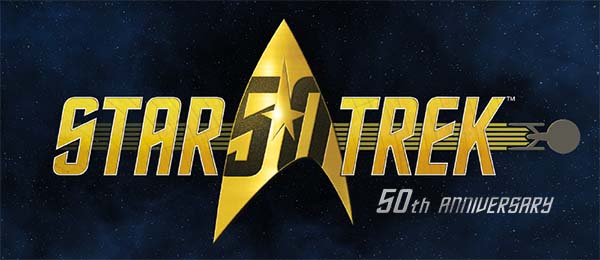
On September 8, 1966, a cultural revolution started. The first episode of a new science fiction television series named Star Trek premiered on NBC. This series broke new ground in the genre of science fiction by being one of the first series ever to present high science fiction concepts to television audiences, while also using its space adventures as allegories for contemporary social and political issues. While it presented itself as mindless space adventure in the same vein as Buck Rogers and Flash Gordon, it took a serious approach to science fiction that (at the time) was limited to literature like the novels of H.G. Wells and the stories of Isaac Asimov.
Star Trek wasn't the first serious science fiction television series. Shows like The Twilight Zone and The Outer Limits had existed for a almost a decade. But Star Trek differed from these series in that it depicted a revolutionarily positive and uplifting version of the future of humanity during the height of the paranoia of the Cold War. Humanity, according to Star Trek would overcome the threat of mutual destruction that the Cold War between the United States and the Soviet Union posed, and we would come out the other side with a spirit of cooperation and a desire to peacefully and benevolently explore the stars, exploring strange new worlds and seeking out new life and new civilizations.
Television science fiction was dominated by childish adventures like Buck Rogers
and more cynical anthology series like The Twilight Zone that drew off of Cold War paranoia.
The show was created by Gene Roddenberry, a former United States army air force pilot and Los Angeles police officer who eventually found his calling as a television writer and producer. He wrote and produced some police dramas and westerns before pitching his defining project: Star Trek. The show was picked up by Desilu Productions, a company that was run by Lucille Ball (yes, the titular actress of I Love Lucy) and her husband. The production of Star Trek was tumultuous. The show was canceled by NBC after its second season, only to be revived due to an unprecedented, fervent letter-writing campaign staged by its fans. It did not survive its third season, however, as Desilu Productions was rapidly running out of money, was forced to cut budgets, and NBC moved the show to the dreaded Friday night "death" slot. In an age before DVRs, or even VCRs, if people were out on the town on a Friday night, and they missed an episode of a show, then that episode simply went unseen.
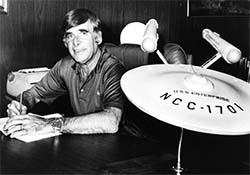
Gene Roddenberry's optimistic vision
of the future remains endearing.
The series eventually saw tremendous success after its cancellation due to its episodes being syndicated during the 1970's. It gained a cult following that grew and grew, setting up conventions that would come to draw thousands of attendees. Though not immediately apparent, Star Trek would grow to become one of (if not the) most successful science fiction properties in the world. The series is often cited by scientists, engineers, and astronauts as their inspirations for their careers, and the technology of the series has inspired many real-world technological innovations, such as wireless communication, mobile devices (in particularly mobile phones), speech-recognition software, and so on. Roddenberry became the first TV writer to receive a star on the Hollywood walk of fame, has been inducted into the Science Fiction Hall of Fame and the Academy of Television Arts & Sciences Hall of Fame, and was one of the first human beings ever to have his ashes carried into earth orbit... [More]
a36b33e8-1404-42b1-9723-a4759be0acee|2|5.0
Tags:Star Trek, Star Trek: the Next Generation, Star Trek: Deep Space Nine, Star Trek: Voyager, Star Trek: Enterprise, Star Trek: Discovery, Star Trek VI: the Undiscovered Country, Star Trek: Beyond, birthday, anniversary, science fiction, allegory, humanism, humanist, Gene Roddenberry, NBC, CBS, Fox, Paramount, Desilu Production, Lucille Ball, Cold War, Balance of Terror, The Measure of a Man, Kirk, Spock, Data, Gul Dukat, Seven of Nine, Star Trek the Experience, Las Vegas, Wallace Shawn, Grand Nagus Zek
|

| 12 | | | | | | | 60 | | 11 | | | | | | | 55 | | 10 | | | | | | | 50 | | 09 | | | | | | | 45 | | 08 | | | | | | | 40 | | 07 | | | | | | | 35 | | 06 | | | | | | | 30 | | 05 | | | | | | | 25 | | 04 | | | | | | | 20 | | 03 | | | | | | | 15 | | 02 | | | | | | | 10 | | 01 | | | | | | | 05 |
|